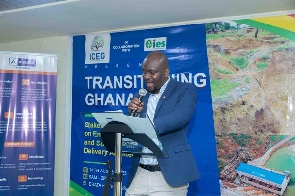The Institute of Climate and Environmental Governance (ICEG) commends the leaders of African nations for their collective commitment to addressing the pressing issue of climate change, as expressed in the Communique of the African Climate Summit.
We acknowledge the importance of this historic gathering and recognize the positive strides made by African nations in the fight against climate change. The Communique represents a significant step toward a more sustainable and resilient future for the continent.
The African Climate Summit Communique, while well-intentioned and addressing crucial issues, falls short in several key areas and leaves much to be desired in terms of concrete action and accountability.
The Communique lacks specific, measurable, and time-bound commitments to reduce greenhouse gas emissions. It mentions vague goals such as "working towards carbon neutrality," but it does not provide clear details on how these goals will be achieved or what specific actions will be taken by African nations.
The Communique also mentions the need for financial support from the international community, but it does not outline a clear plan on how African nations intend to allocate and manage these funds effectively.
While ICEG supports the call for a new SDR of US$650billion for climate crisis response and operationalization of the Loss and Damage Fund, without a transparent and accountable climate governance framework by African countries, there is a risk that funds may not reach the intended beneficiaries or be misused.
In addition, the Communique does not establish clear mechanisms for enforcing commitments made by African nations. Without effective monitoring, reporting, and enforcement mechanisms, there is a risk that some countries may not take their climate commitments seriously, undermining the overall effectiveness of the summit's outcomes.
While adaptation is undoubtedly important, the Communique seems to prioritize adaptation measures over mitigation efforts. Mitigation, which involves reducing emissions, is crucial in preventing further climate change, and African nations should play an active role in this regard. The Communique should have emphasized a balanced approach between adaptation and mitigation strategies.
Furthermore, the Communique reflects the views of African leaders, it does not sufficiently incorporate the voices of civil society organizations, youth climate activists, indigenous communities, the private sector, and marginalized groups who are disproportionately affected by climate change. Inclusivity is crucial for developing holistic and effective climate solutions.
Last, but not least, the Communique should have placed a stronger emphasis on fostering innovation and technology transfer to help African nations leapfrog to cleaner and more sustainable technologies. This is essential for long-term climate resilience and economic development.
Recommendations
1. AU member states should be charged to develop renewable energy governance frameworks with requisite legal backing within their respective states by 2024. Effective governance frameworks with legal backing would prove useful in guaranteeing transparency in the use of climate funds. It will also foster clarity in policy formulation and implementation.
3. The AU should also require an annual percentage allocation of member states GDP towards renewable energy investments while also demanding a percentage of the current energy shortfalls in member states to be filled with renewable energy. This will guarantee continuous investments in clean energy while at the same time reducing the cost of transitioning from conventional sources of energy to renewable energy.
4. Introduce regulatory incentives and frameworks that encourage banks to offer green financial products. This includes providing tax incentives, reduced capital requirements, or favourable treatment for green investments. This would encourage private sector involvement in renewable energy development.
In conclusion, the African Climate Summit Communique, while a step in the right direction, leaves much room for improvement. It should have provided more specific commitments, a balanced approach between adaptation and mitigation, clear plans for resource allocation and enforcement, greater engagement with the private sector, and a stronger focus on technology and innovation.
Additionally, it should have taken into account the diverse regional challenges and ensured greater inclusivity in the decision-making process. Addressing these shortcomings is essential for the Communique to make a meaningful impact in the fight against climate change in Africa.
Signed
Hamza S. Suhuyini
(Executive Director)
Press Releases of Tuesday, 12 September 2023
Source: ICEG

















